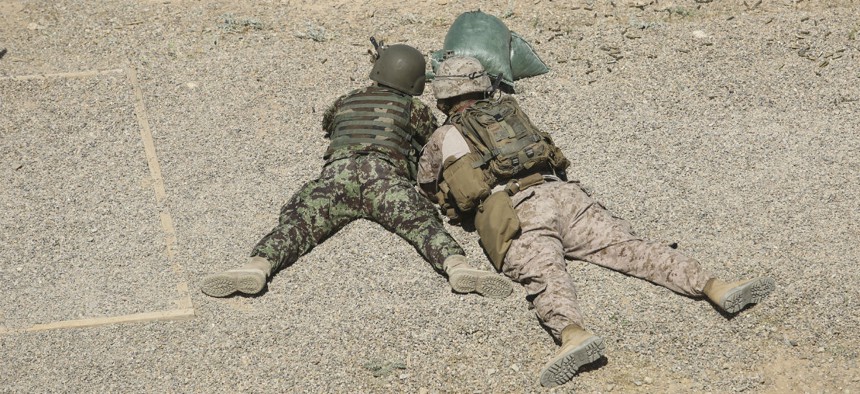
A Marine with Task Force Southwest watches as an Afghan National Army soldier with the Helmand Regional Military Training Center fires an M4 carbine at Camp Shorabak, Afghanistan. Sgt. Lucas Hopkins / U.S. Marine Corps
U.S. Was ‘Ill-Prepared’ to Help Train Afghan Security Forces, IG Finds
“One U.S. officer watched TV shows like Cops and NCIS” for lesson plans, watchdog says.
Just weeks after President Trump announced a stepped-up U.S. troop presence in Afghanistan, a watchdog released a “lessons learned” report noting that “Afghan security forces are not yet capable of securing their own nation” despite U.S. expenditures of $71 billion since 2002.
“The U.S. government was ill-prepared to conduct security sector assistance programs of the size and scope required in Afghanistan,” wrote John Sopko and his staff at the Special Inspector General for Afghanistan Reconstruction. “The lack of commonly understood interagency terms, concepts and models for security sector assistance undermined communication and coordination, damaged trust, intensified frictions, and contributed to initial gross under-resourcing of the U.S. effort to develop the” local forces.
In an interactive illustrated report (with links to past SIGAR reports) and a speech on Thursday to the Center for Strategic and International Studies, Sopko said, “The U.S. government is not well organized to conduct [security sector assistance] missions in post-conflict nations or in the developing world. Furthermore, our doctrine, policies, personnel, and programs are insufficient to meet SSA mission requirements and expectations.”
Focusing primarily on the military services, the Defense and State departments and the intelligence agencies, the report traced the problems to the Sept. 11, 2001, terrorist attacks. At that time, the U.S. military had no plans prepared and readily available for operations in Afghanistan, the report said.
“The U.S. response was initially led by Central Intelligence Agency operators, leveraging intelligence assets and personal relationships with anti-Taliban militias, mainly the Northern Alliance faction,” SIGAR noted. “Department of Defense planners focused on kinetic operations and had little time to plan for post-conflict reconstruction, including building a national army and police force.”
Donations from individual nations, rationales for joining the coalition, resource constraints and military capabilities, as well as NATO’s force generation processes “led to an increasingly complex implementation of programs and the lack of an agreed-upon framework for conducting SSA activities,” the report said.
As a result, years of auditing by the IG’s staff showed that U.S. military plans and Afghan forces “were created under politically constrained timelines, rather than based upon realistic assessments of Afghan readiness.”
More than 100,000 Afghan police were trained by U.S. Army aviators, infantry officers and civilian contractors, but the NATO training mission was chronically understaffed by more than 50 percent, the report said. “One U.S. officer watched TV shows like Cops and NCIS to learn what he should teach,” SIGAR found.
The report distilled the conclusions into 11 lessons, plus dozens of recommendations for Congress, the broad executive branch and the Pentagon, followed by “Afghanistan-specific” proposals.
A security sector assistance effort “cannot employ a one-size-fits-all approach; it must be tailored to a host nation’s context and needs,” the report said. Progress against local corruption, illiterate workforces and weak economic development will not be achieved “if the host nation does not fully buy into such efforts and take ownership of [the security assistance] program,” it added. “Developing foreign military and police capabilities is a whole-of-government mission.”
Frequent turnover of western specialists hampered the effort, and within the U.S. services, “SSA training and advising positions are not currently career enhancing for uniformed military personnel, regardless of the importance U.S. military leadership places on the mission,” the IG said.
Sopko took the initiative in preparing the lessons after being asked to by former Ambassador Ryan Crocker, former commander of U.S. forces in Afghanistan Marine Gen. John Allen and several members of Congress, he said in the speech.
Among SIGAR’s recommendations: Congress should establish a commission to review the authorities, roles and resources of each agency stakeholder in security sector assistance work. Congress should also identify a lead agency for all future overseas efforts in police force building.
Within the Defense Department, “The Office of the Secretary of Defense for Personnel and Readiness should leverage internal DoD databases to track military and civilian experts in security sector governance for future efforts to advise ministerial-level security sector personnel in key areas of logistics, human resources, internal affairs and finance,” it said.
The broader government, the report added, should create incentives to enhance military and civilian careers in security sector assistance.







